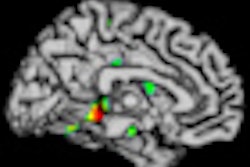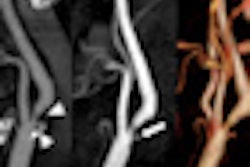Research using MRI indicates that small areas of dead brain cells, or silent strokes, found in approximately one of four older adults are linked to memory loss later in life, according to a new study published in the January 3 issue of Neurology.
The group from Columbia University Medical Center says the findings could provide additional information on memory loss symptoms and their causes, as well as help develop new methods of prevention. The study was led by Dr. Sonja Blum, PhD, from Columbia's Taub Institute for Research on Alzheimer's Disease and the Aging Brain (Neurology, January 3, 2012, Vol. 78:1, pp. 38-46).
The researchers analyzed 658 people ages 65 years and older who showed no signs of dementia. The subjects were scanned using 1.5-tesla MRI (Intera, Philips Healthcare), and they also underwent tests to measure their memory, language, speed at processing information, and visual perception.
Among the participants, 174 (26%) had silent strokes. Of those subjects, 132 were placed into a subcortical infarct group and 42 into a cortical infarct group, based on the location of the silent strokes. The remaining 484 individuals were in the "no infarct" group.
Upon review of MRI results, the researchers found that individuals with subcortical and cortical infarcts were more likely to have a clinical history of stroke, and participants with no infarct had larger relative hippocampal volumes -- the section of the brain associated with memory function -- than those with subcortical infarcts.
Mild cognitive impairment was found in 643 participants; a greater proportion of individuals with cortical infarcts met the mild cognitive impairment criteria, compared with those without infarct.
Hippocampal volume was associated with the long-term recall and delayed recognition aspects of the study's selective reminding test, and with delayed free recall. Subcortical infarcts correlated with performance on learning, long-term recall, and delayed free recall. Cortical infarcts were associated with performance on selective reminding test delayed recognition.
Blum and colleagues noted that individuals with infarct scored worse on memory tests than those with no signs of silent strokes, regardless of whether or not they had a small hippocampus.
"Since silent strokes and the volume of the hippocampus appeared to be associated with memory loss separately in our study, our results also support stroke prevention as a means for staving off memory problems," said co-author Adam Brickman, PhD.
"Brain infarction is largely a silent injury and aggressive clinical screening and neuroradiologic examination would be needed to identify individuals with and at risk for development of brain infarcts," the authors wrote. "Brain infarcts are a largely preventable brain injury, with clearly identified risk factors and prevention programs. A public health push toward emphasizing stroke prevention may significantly decrease incidence of dementia."
The study was supported by the U.S. National Institutes of Health.



.fFmgij6Hin.png?auto=compress%2Cformat&fit=crop&h=100&q=70&w=100)




.fFmgij6Hin.png?auto=compress%2Cformat&fit=crop&h=167&q=70&w=250)











